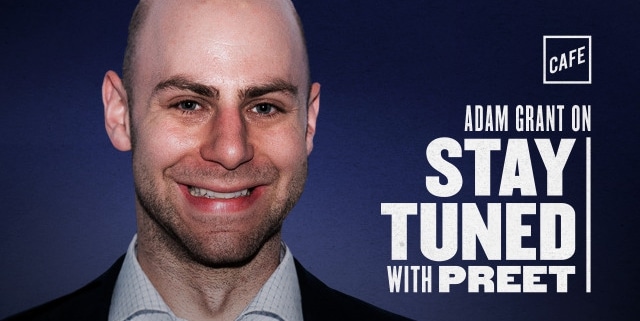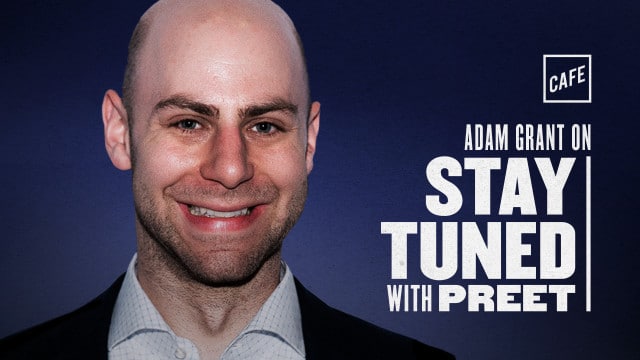Listen to Adam Grant Talk Leadership Science with Preet Bharara

It is safe to say that I am a podcast junkie. Whenever I find myself “ears-free”—while taking a shower, walking the dog, riding the subway—I listen to an episode. Usually it is intellectual fare—scientists or other sorts of scholars discussing their new books with, for instance, comedian Joe Rogan (on whose show our founder, Jon Haidt, just appeared). Recently I’ve wandered into more current- and legal-affairs territory, and discovered “Stay Tuned” with Preet, hosted by Preet Bharara, a former US attorney for the Southern District of New York who President Trump fired.
Bharara’s show, which airs weekly, typically features a guest—usually a journalist or a political analyst—who offers expert opinion on recent events. In 2018 he had the likes of Jeffrey Toobin, who writes about law for The New Yorker, CNN’s Fareed Zakaria, and Bill Browder, the author of Red Notice: A True Story of High Finance, Murder, and One Man’s Fight for Justice. Yet it was Wharton organizational psychologist Adam Grant, an Ethical Systems collaborator, who was one of Bharara’s choice guests.
Bharara interviewed Grant in April but, at the end of 2018, he republished the episode, titled “The Science of Leadership (with Adam Grant).” “I speak with him about the qualities of a leader, the pitfalls of charisma, and what makes an organization run well—whether that organization is a company, a district attorney’s office or, say, a presidential administration,” Bharara said, in a newly recorded introduction. “This has to be one of my favorite conversations of the past year, and I want to bring it back as the year ends.” When they spoke, John Kelly was still Trump’s chief of staff. That’s the only thing that dates the episode, Bharara said. “Adam’s wisdom still stands.”
Part of their conversation’s charm stems from hearing how Grant became the sort of self-scrutinizing person he now is. He was a springboard diver on the college swim team. “One of the things that was always striking to me as a diver was how many times I’d go up in the air and think I’d done a pretty good dive, and then pop out of the water and my coach would say, “Adam, that was bad.” Bharara wondered if this arose from a lack of self-awareness. “Yeah,” Grant said. “When you’re somersaulting and twisting, it’s really hard to know exactly where you are and feel whether your entry is perfectly straight, or whether you’re a little bit turned sideways. I think that’s so true in our work lives. Sadly, most of the time we can’t see our performance objectively. So, in the same way that I would sit down and watch video tapes of my dives, to see what my coach was seeing, I think we need other people to hold up a mirror so that we can see ourselves more clearly at work.”
Bharara also asked Grant how people might effectively work with a particularly intransigent and incurious leader, like Trump, who—in a host of ways, like punishing people who offer critical feedback—fosters a toxic work environment, the sort of behavior that’s antithetical to what we outline on our “Leadership” research page. Grant suggested ways people could strategically manage a leader’s difficult or defensive personality. “Even the most defensive person you know—there are moments when they’re a little bit more open,” Grant said, “and your job is to observe the fluctuations, and figure out what the patterns are.”
There are also some ways to intervene to make someone more open to suggestions. “My favorite experiment on this showed that if you just say [the following] words before criticizing someone, they become about 40 percent more open to negative feedback,” Grant said. “The words are, roughly, ‘I’m giving you these comments because I have high expectations of you, and I’m confident you can reach them.’” Bharara wondered if Kelly should really say something like this to Trump. Grant clarified that he’d tailor the language to Trump’s unique demeanor and history by saying, “Mr. President, you have a track record of making some really creative decisions, and you’ve taken bold steps where other people were afraid to act. And I think that’s a big factor behind your success. There are also times when that could be the wrong move.”
Listen to Grant’s whole interview with Bharara here, in which he delves into, among other things, the key traits of great leadership—one being “socialized charisma” as opposed to “personalized charisma,” the latter of which inspires personal loyalty instead of inspiring dedication to a useful cause. Then be sure to check out Grant’s “Personality & Personnel” research page on Ethical Systems.
Brian Gallagher is Ethical Systems’ Communications Director. Follow him on Twitter @brianga11agher.







